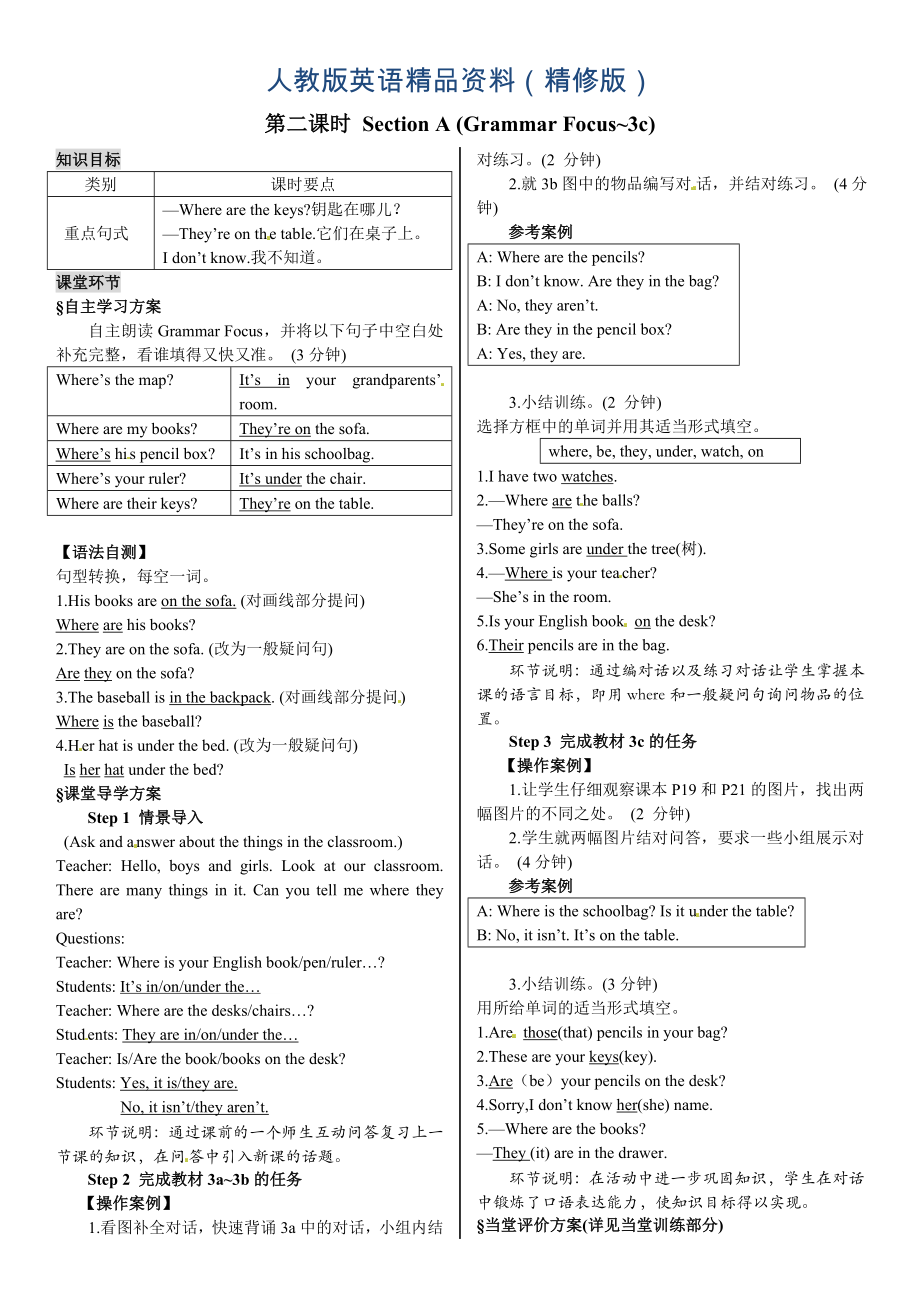《人教版新目標(biāo)英語(yǔ) 七年級(jí)上冊(cè)Unit 4 導(dǎo)學(xué)案第二課時(shí)精修版》由會(huì)員分享,可在線(xiàn)閱讀����,更多相關(guān)《人教版新目標(biāo)英語(yǔ) 七年級(jí)上冊(cè)Unit 4 導(dǎo)學(xué)案第二課時(shí)精修版(2頁(yè)珍藏版)》請(qǐng)?jiān)谘b配圖網(wǎng)上搜索。
1����、人教版英語(yǔ)精品資料(精修版)
第二課時(shí) Section A (Grammar Focus~3c)
知識(shí)目標(biāo)
類(lèi)別
課時(shí)要點(diǎn)
重點(diǎn)句式
—Where are the keys?鑰匙在哪兒?
—They’re on the table.它們?cè)谧雷由稀?
I don’t know.我不知道��。
課堂環(huán)節(jié)
§自主學(xué)習(xí)方案
自主朗讀Grammar Focus����,并將以下句子中空白處補(bǔ)充完整,看誰(shuí)填得又快又準(zhǔn)�。 (3分鐘)
Where’s the map?
It’s in your grandparents’ room.
Where are my books?
They’r
2、e on the sofa.
Where’s his pencil box?
It’s in his schoolbag.
Where’s your ruler?
It’s under the chair.
Where are their keys?
They’re on the table.
【語(yǔ)法自測(cè)】
句型轉(zhuǎn)換����,每空一詞。
1.His books are on the sofa. (對(duì)畫(huà)線(xiàn)部分提問(wèn))
Where are his books?
2.They are on the sofa. (改為一般疑問(wèn)句)
Are they on the sofa?
3.T
3���、he baseball is in the backpack. (對(duì)畫(huà)線(xiàn)部分提問(wèn))
Where is the baseball?
4.Her hat is under the bed. (改為一般疑問(wèn)句)
Is her hat under the bed?
§課堂導(dǎo)學(xué)方案
Step 1 情景導(dǎo)入
(Ask and answer about the things in the classroom.)
Teacher: Hello, boys and girls. Look at our classroom. There are many things in it. Can yo
4����、u tell me where they are?[來(lái)源:學(xué)&科&網(wǎng)Z&X&X&K]
Questions:
Teacher: Where is your English book/pen/ruler…?
Students: It’s in/on/under the…[來(lái)源:學(xué).科.網(wǎng)]
Teacher: Where are the desks/chairs…?
Students: They are in/on/under the…
Teacher: Is/Are the book/books on the desk?
Students: Yes, it is/they are.
5、
No, it isn’t/they aren’t.
環(huán)節(jié)說(shuō)明:通過(guò)課前的一個(gè)師生互動(dòng)問(wèn)答復(fù)習(xí)上一節(jié)課的知識(shí)�,在問(wèn)答中引入新課的話(huà)題。
Step 2 完成教材3a~3b的任務(wù)
【操作案例】
1.看圖補(bǔ)全對(duì)話(huà)��,快速背誦3a中的對(duì)話(huà)���,小組內(nèi)結(jié)對(duì)練習(xí)�����。(2 分鐘)
2.就3b圖中的物品編寫(xiě)對(duì)話(huà)��,并結(jié)對(duì)練習(xí)�。 (4分鐘)
參考案例
A: Where are the pencils?
B: I don’t know. Are they in the bag?
A: No, they aren’t.
B: Are they in the pencil box?
A: Yes, th
6���、ey are.
3.小結(jié)訓(xùn)練����。(2 分鐘)
選擇方框中的單詞并用其適當(dāng)形式填空���。
where, be, they, under, watch, on
1.I have two watches.
2.—Where are the balls?
—They’re on the sofa.
3.Some girls are under the tree(樹(shù)).
4.—Where is your teacher?[來(lái)源:Zxxk.Com]
—She’s in the room.
5.Is your English book on the desk?
6.Their penci
7��、ls are in the bag.
環(huán)節(jié)說(shuō)明:通過(guò)編對(duì)話(huà)以及練習(xí)對(duì)話(huà)讓學(xué)生掌握本課的語(yǔ)言目標(biāo)�����,即用where和一般疑問(wèn)句詢(xún)問(wèn)物品的位置�。
Step 3 完成教材3c的任務(wù)
【操作案例】
1.讓學(xué)生仔細(xì)觀(guān)察課本P19和P21的圖片��,找出兩幅圖片的不同之處���。 (2 分鐘)
2.學(xué)生就兩幅圖片結(jié)對(duì)問(wèn)答����,要求一些小組展示對(duì)話(huà)���。 (4分鐘)
參考案例
A: Where is the schoolbag? Is it under the table?
B: No, it isn’t. It’s on the table.
3.小結(jié)訓(xùn)練��。(3分鐘)
用所給單詞的適當(dāng)形式填空����。
1.Are those(that) pencils in your bag?
2.These are your keys(key).
3.Are(be)your pencils on the desk?
4.Sorry,I don’t know her(she) name.[來(lái)源:Z+xx+k.Com]
5.—Where are the books?
—They (it) are in the drawer.
環(huán)節(jié)說(shuō)明:在活動(dòng)中進(jìn)一步鞏固知識(shí)���,學(xué)生在對(duì)話(huà)中鍛煉了口語(yǔ)表達(dá)能力�����,使知識(shí)目標(biāo)得以實(shí)現(xiàn)���。
§當(dāng)堂評(píng)價(jià)方案(詳見(jiàn)當(dāng)堂訓(xùn)練部分)
 人教版新目標(biāo)英語(yǔ) 七年級(jí)上冊(cè)Unit 4 導(dǎo)學(xué)案第二課時(shí)精修版
人教版新目標(biāo)英語(yǔ) 七年級(jí)上冊(cè)Unit 4 導(dǎo)學(xué)案第二課時(shí)精修版

